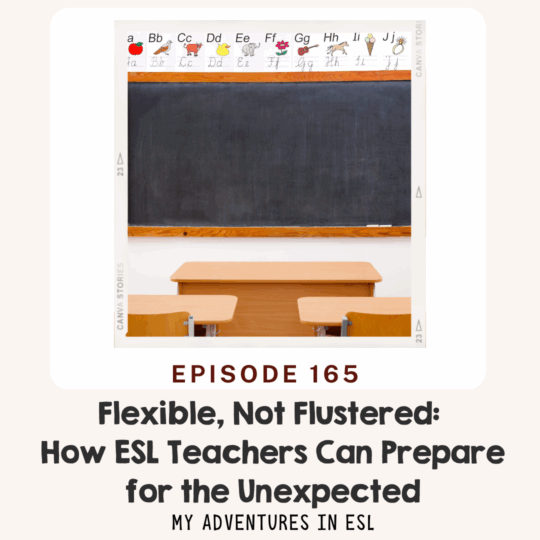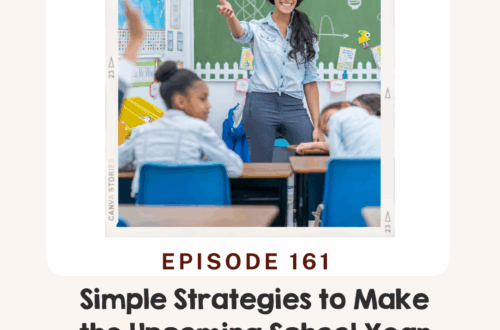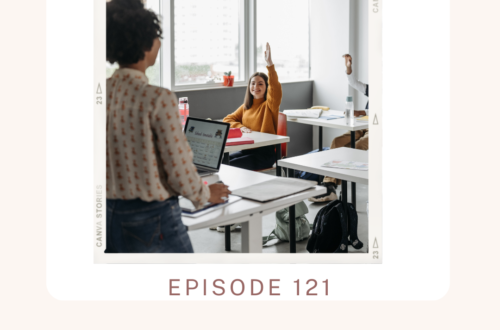
Ep. 165 Flexible, Not Flustered: How ESL Teachers Can Prepare for the Unexpected
Welcome educators! Before we get started, I want to share the amazing resources I have available.
To learn more and download some engaging resources, go to myadventuresinesl.com/store.
Before we start, I just want to take a moment to say this: if you’re feeling nervous about the unknowns of the upcoming school year, you’re not alone. Teaching — especially in an ESL classroom — can be unpredictable. New students might arrive unexpectedly, schedules can shift, and the support you were promised may not always be there right away.
But here’s what I want you to remember: your flexibility is a superpower. Your ability to adapt, adjust, and keep showing up for your students makes all the difference. You don’t have to have it all figured out right now. Just focus on building the mindset that you can handle what comes your way — because you absolutely can.
You’re doing incredible work. You’re not just teaching language — you’re building trust, confidence, and community. So take a deep breath, give yourself some grace, and know that whatever changes come your way this year, you are more than ready.”
The goal of this week’s podcast is to provide guidance and strategies on mentally preparing yourself to be flexible about any changes you might encounter during the beginning of the year.
I can remember it like it was yesterday. It was the beginning of the school year, and I felt like I had done everything I could to prepare for the school year. I had spent the summer prepping lessons, the first day of school activities, and getting my room set up. The first day came, and none of my students were scheduled for my class. The week was creeping by, and I still hadn’t seen any students, however, I was expected to have newcomers who didn’t have a schedule sit in my class all day.
Everything I had planned went out the window. I was then forced to find lessons for those students who hadn’t been scheduled for other classes. On top of all of that, I was still expected to do all my compliance that needed to be completed in 15 business days.
This led to feelings of being overwhelmed, inadequate, and even a sense of hopelessness. If you are having feelings of anxiety, I want you to know you are not alone.
Imagine walking into your classroom on day one and knowing you have a flexible plan, a few routines in place, and the mindset that no matter what happens, you can handle it. That’s the kind of peace I want for you.
Have you ever had an unexpected moment that taught you that it is important to be flexible?
Being flexible as a teacher isn’t just helpful—it’s essential. I feel like they should list flexibility as part of the job description. Education is constantly changing at the state and federal levels.
No matter how well we plan, the reality is that students, classrooms, and even school systems are constantly shifting. Language learners may arrive mid-year, language levels can vary widely, tech may glitch, or lessons may take an unexpected turn.
Flexibility allows us to respond, not react, to those changes with calm and confidence.
For ESL teachers in particular, flexibility helps us meet students exactly where they are. Language learning isn’t linear, and our students bring unique needs, backgrounds, and strengths to the classroom.
When we’re willing to adjust instruction, reframe our expectations, or pivot to support students emotionally and academically, we create a welcoming and safe environment for the students.
When we model that flexibility, our students learn how to stay resilient and adaptable; it’s one of the greatest gifts we can give them.
Let’s dive into how you can do this every day with your students.
Accepting Change
The first step is acceptance. Coming into this profession, you will need to accept that it is ever-changing and that you will have to be flexible. Depending on your background and work history, you might find this problematic.
I want you to know that it is normal for things to shift. This can look like a change in your student roster, classroom placements, scheduling, and even your curriculum. One thing that works for me when I start to get anxious and stressed about something sudden is saying affirmations. Here are some you can say:
🧠 “I can’t control everything, but I can adapt.”
🧠 “Change doesn’t mean failure—it means growth.”
Visualize Multiple Scenarios
When it is time to brainstorm and plan for the year, think about how multiple scenarios can play out. Here are some examples of scenarios:
- What happens if you get more students than expected?
- What if my room assignment is changed, and I have to share a room?
- What if I have to teach a different level than what I planned to teach?
Visualizing scenarios will help you plan and be prepared for some of the possibilities that might happen. I want to note that you don’t have to have a plan written out for these scenarios; however, mentally preparing yourself will prove to be valuable.
Before we jump back in, I want to take a quick moment to tell you about something that can truly change your summer planning game…
If you’ve ever felt overwhelmed trying to figure out what to do first, how to get organized, or how to confidently walk into the school year with a plan, you are not alone. That’s exactly why I created The ESL Teacher Master Plan.
This self-paced course walks you step-by-step through how to plan and prepare for the upcoming school year as an ESL teacher. From setting up your classroom systems to creating lessons that work across language levels, it’s all in there—broken down into simple, actionable steps.
So if you’re ready to feel calm, clear, and excited to start the year, head to My Adventures in ESL to check out The ESL Teacher Master Plan Wait List. I’d love to support you this summer!
Alright—let’s get back into it.
Find or Build a Support System
Having a support system is the key to being flexible. Whether it’s connecting with other ESL teachers, joining an online community, or just finding one person to vent and laugh with—it helps so much to know you’re not alone. Flexibility doesn’t mean doing it all by yourself.
During my first year, my support system was other first-year teachers from different grades and subject areas. This was set up through my school and helped establish a support system. A lot of the teachers that I connected with through that support system, I am still friends with to this day.
If today’s episode gave you something to think about, I’d love for you to take one small step this week:
Write down one way you can stay flexible during the first few weeks of school. It could be prepping a backup activity, building in breathing room, or just reminding yourself that it’s okay when plans change.
And if this episode resonated with you, share it with another ESL teacher who might need the encouragement. 💛
You can also connect with me on Instagram @My Adventures in ESL and let me know: What helps YOU stay flexible as a teacher? I’d love to hear your thoughts!



